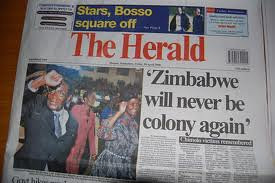
The Zimbabwe Herald is the leading state newspaper in the Southern African state. The headline reveals its anti-imperialist political character., a photo by Pan-African News Wire File Photos on Flickr.
Zanu-PF’s stance on land right
Tuesday, 23 October 2012 00:00
Zimbabwe Herald News Editor
Hebert Zharare
“The land is the economy and the economy is land,” the Head of State and Government and Commander-in-Chief of the Zimbabwe Defence Forces, President Mugabe has said these words in many political platforms. Zanu-PF believes the only way Zimbabweans can improve themselves is for those with potential to be assisted to set up businesses and employ others.
The party has unveiled vast opportunities through access to land for thousands of Zimbabweans to venture into agriculture and other businesses.
While other political parties have tried to rubbish it as an election agenda, the fact is lots of people have benefited and are still benefiting from a deliberate decision by the party to improve the wellbeing of Zimbabweans who for long have been marginalised by successive repressive laws by the colonial system.
Even before the formation of the now dysfunctional inclusive Government in February 2009, Zanu-PF formed some ministries in pursuant of its goal of economically transforming the lives of previously marginalised people. Some of the ministries become a common feature of the Government since 1980.
These are Ministries of Small to Medium Enterprises, Youth Development, Indigenisation and Empowerment and Women Affairs, Gender and Community Development among others. Although a number of empowerment initiatives have been pursued before, it is intriguing to note that many people feel the land reform programme initiated in the 1990s remains the best empowerment tool for Zimbabweans.
Yes, the programme might have some pitfalls, but in terms of broad based empowerment agenda, the policy cuts across all social and economic facets of the country. The land reform has indeed addressed one of the main reasons for waging the bitter liberation struggle and ensures that Zimbabweans have a hold to the means of production.
However, as the political clock ticks towards next year’s general elections, it is imperative to remind policy makers that there is a vast constituency that could make a huge difference in the country’s body politic if they are given land — youths.
All the youths who were in high schools, colleges and universities when the fast track land reform exercise commenced and were thus left out of the programme now want land and have the potential to make huge impact on the agriculture sector.
Some people might argue that the land reform programme is over and those who missed out should try other sectors of the economy, but I beg to differ.
After making a careful consideration, one will say there is still room to accommodate more people mainly the youths with capital to buy some farming inputs. There are vast swathes of virgin land countrywide that can be cleared for agricultural purposes.
At the same time scores of new farmers are holding onto thousands of hectares of farm land which they are not utilising. These people should surrender part of the underutilised land to remain with the maximum farm size of 350 hectares that will be gazetted by Government.
The surrendered land can then redistributed among the landless people.
There are concerns that some new farmers holding on to large tracks of idle land will never let it go because they are protected by powerful politicians and some lands committees officers in some provinces. This should never be tolerated if we are to satisfy the huge hunger for land that still exists among our people.
But the mere fact that people cannot surrender land clearly shows that the land remains and will remain a powerful campaign tool for those who know what the people want. Those who deny this fact are either ignorant or want to discredit the land as they are on the wrong side of the land issue.
Zanu-PF spokesperson Cde Rugare Gumbo, said land was still a viable campaign issue especially if it catered for the young people.
“Our provincial governors always say there is no land to give to the young people and I differ with that. There is a lot of virgin land that can be cleared for agricultural purposes. The problem is the people want to hold onto farm houses and land that is already cleared,” he said.
Cde Gumbo said the land reform exercise just like any other empowerment programme by Zanu-PF was meant to address a genuine need among the people.
As such everyone, youths, the old and people of different political persuasion have a claim to the land.
In fact everyone, businesspeople included, has been touched in one way or another by the land reform programme. The programme that benefited over 400 000 people under both A1 and A2 farming models will remain the best empowerment programme to be delivered for the people of Zimbabwe.
Before the land reform programme, only 4 000 whites were holding onto over 70 percent of the country’s arable land. Some empowerment programmes remain a preserve for the rich and powerful in urban areas, but the land reform programme has seen poor people in rural areas becoming masters of their destiny.
Following the exit of the white former commercial farmers, many villagers rushed into these sectors. Some observers say this year alone tobacco farmers countrywide pocketed collectively over US$500 000 from the more than 144 million kilogrammes of tobacco sold.
These are not handouts, but money earned from sweat and days in the heat of the day toiling the land. Zimbabwe’s land issue generated unprecedented debates both within and outside the country as some people misunderstood Zanu-PF’s agenda.
Sensing the danger the land reform would have, the West quickly impose sanctions on us.
No comments:
Post a Comment